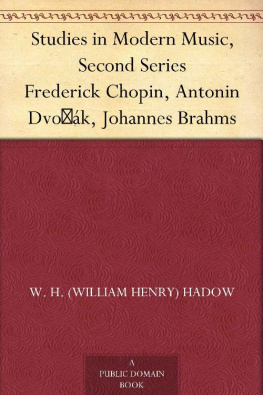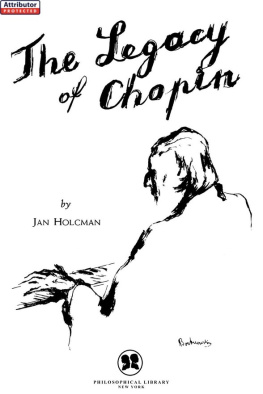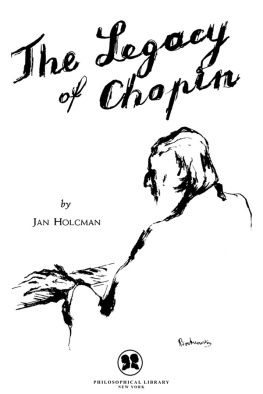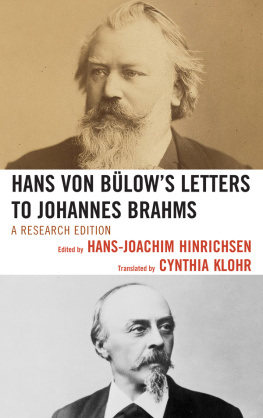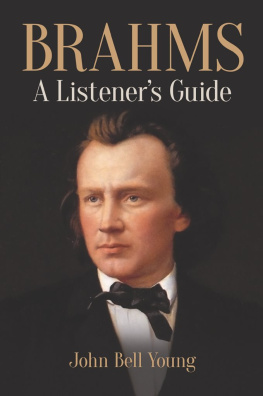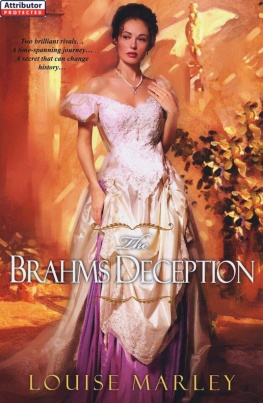STUDIES
IN MODERN MUSIC
SECOND SERIES
FREDERICK CHOPIN ANTONIN DVOK
JOHANNES BRAHMS
BY
W. H. HADOW, M.A.
Fellow of Worcester College, Oxford
FIFTH EDITION
LONDON
SEELEY AND CO. LIMITED
38 Great Russell Street
1904
Dedicated to
C. F.
CONTENTS
| OUTLINES OF MUSICAL FORM |
| CHAP. | PAGE |
| I.FACULTIES OF APPRECIATION, |
| II.STYLE AND STRUCTURE, |
| III.FUNCTION, |
| FREDERICK CHOPIN |
| I.WARSAW, |
| II.PARISAND AN EPISODE, |
| III.A LYRIC POET, |
| ANTONIN DVOK |
| I.DAYS OF PREPARATION, |
| II. DURCH KAMPF ZU LICHT , |
| III.NATIONAL AND PERSONAL CHARACTERISTICS, |
| JOHANNES BRAHMS |
| I.GROWTH, |
| II.MATURITY, |
| III.THE DIRECTION OF THE NEW PATHS, |
| , |
LIST OF ILLUSTRATIONS
| PAGE |
| FREDERICK CHOPIN, from a drawing by Winterhalter , |
| FREDERICK CHOPIN, from a drawing made after death, by Graefle , |
| ANTONIN DVOK, from a photograph by Duras , |
| JOHANNES BRAHMS, from a photograph, |
NOTE
The following works have been consulted for the present volume:
Dr Parry'The Art of Music.'
Sir George Grove'Dictionary of Music and Musicians,'
particularly Mr Fuller-Maitland's article
on Dvok.
'Life of Chopin,' by Liszt.
'Life and Letters of Chopin,' by Moritz Karasowski.
'Life of Chopin,' by Professor Niecks.
'Chopin,' by Charles Willeby.
'Chopin and other Essays,' by Henry T. Finck.
'Les trois Romans de Chopin,' by Count Wodzinski.
'Musical Studies,' by Dr Hueffer.
George Sand 'Histoire de ma vie.'
George Sand 'Correspondance.'
George Sand 'Un Hiver Majorque.'
George Sand 'Lucrezia Floriani.'
George Sand 'Elle et Lui.'
P. de Musset 'Lui et Elle.'
'George Sand,' by E. Caro.
'George Sand,' by Bertha Thomas.
'George Sand,' by Matthew Arnold.
Sainte Beuve 'Portraits Contemporains.'
Delacroix 'Lettres.'
Heine'Lutetia.'
Henry James'French Poets and Novelists.'
E. Zola 'Documents Litteraires.'
'Journal des Goncourt.'
'Une Contemporaine,' by M. Brault.
'Antonin Dvok,' by Dr Zubaty.
'Antonin Dvok,' by H. E. Krehbiel. (Century, Sept. 1892.)
'Antonin Dvok,' by J. J. Kral. (Music; Chicago; Oct. 1893.)
'Antonin Dvok,' by Dr Stecker. (New Bohemian Encyclopdia.)
E. Chvala 'Ein Vierteljahrhundert Bhmischer Musik.'
'Johannes Brahms,' by Dr Deiters.
'Johannes Brahms,' by Bernhard Vogel.
'Johannes Brahms in seinen Werken,' by E. Krause.
J. A. Fuller-Maitland'Masters of German Music.'
Dr Spitta 'Zur Musik.'
Dr Ehrlich 'Dreissig Jahre Knstlerleben.'
The writer wishes to express his most cordial thanks to Mr E. W. Hennell, for permission to use the two portraits of Chopin; to Herr E. Mandyczewski, Librarian of the Gesellschaft der Musikfreunde at Vienna, for assistance in the study of newspaper records and other documents; to Messrs Mourek Naprstek, and Zubaty, for aid and advice in the Libraries at Prague; and to M. Subert, Director of the Czech National Theatre, for permission to consult, in its Library, the scores of Dvok's Operas.
OUTLINES OF MUSICAL FORM
Non leve quiddam interest inter human mentis idola et divin mentis ideas; hoc est, inter placita qudam inania et veras signaturas atque impressiones factas in creaturis, prout inveniuntur. Bacon.
I
FACULTIES OF APPRECIATION
It is only natural that a systematic induction should present itself somewhat late in the history of Science. At first, when the world is new, the process of exploration must necessarily be hazardous and tentative: the discoverer must walk with uncertain steps, and must find his way by the sole aid of his own personal qualities. Hence his method is a part of himself, and can no more be communicated than keenness of sight, or delicacy of touch, or rapidity of instinct; he reaches his conclusions with only a half-consciousness of the road by which they have been attained, and imparts his results more as separate individual dogmas than as interdependent parts of an ordered and coherent scheme. His followers, dazzled by the brilliance of his intellect, and unprovided with any test for distinguishing between facts and fancies, accept everything that he has said, and carry on the work, not by any presumptuous attempt to map out the ground that he has already covered, but by deducing further application of his laws and further development of his principles. It may be that the route which he suggested was purely conjectural; they follow it loyally in the full confidence that it will bring them to the goal. It may be that some assertion was a mere hypothesisa rough and ready explanation which its propounder never lived to correct; none the less, they take it as axiomatic, and force the facts into compliance by some subtle and ingenious interpretation of its terms. The master's word is paramount, and if he and Nature disagree, it is so much the worse for Nature.
For a time, no doubt, there is a real value in this attitude of subserviencethis unquestioning acknowledgment of the prescriptive rights of genius. In science, as in political history, it is good that the earlier steps should be autocratic, and that men should not claim a share in the constitution until they have in some measure qualified themselves for its exercise. When the state is small, a posture of constant criticism is dangerous; when the populace is ignorant, it will pass no very reasonable judgments upon the code. But as the area widens, and the mental activity increases, it becomes more and more impossible to accept as law the untested utterances of an absolute monarch: subjects begin to feel their power and to arrogate their due position; they wish to understand the system which they obey, and, it may be, to revise such of its injunctions as have grown outworn or obsolete, until at last they find their champion, and some Novum Organum appears as the constituted representative of the popular voice. And so the story passes into its third and final stage; the judge himself is tried before a jury of the people at large, his enactments are criticised point by point, and his administration remodelled upon a charter of liberty to which all succeeding kings are amenable.
It is hardly necessary to say that such criticism, if it is to be of any avail, must be moderate in tone and reverent in spirit. The inductive method does not 'equalise all intellects'; there will still be contrasts of hill and valley in the levels of the human mind; there will still be peaks of genius standing, remote and solitary, above the snow line. But it is equally certain that criticism is idle unless it be entirely honest and fearless. When it is uncertain, it should confess its uncertainty without reserve; when it is opposed by some consensus of great names, it should be prepared to acknowledge itself in the wrong, and should keep an open mind for conviction; but in no case should it insult with an unthinking assent any scientific law of which it understands neither the principles nor the application. Of course, not all men have time or inclination or capacity for all topics; some things must necessarily be left on one side in the press and hurry of life; but if we are interested in a subject, we are bound to take some measure of the responsibility which that interest entails. It is a poor occupation to look upon the conflicts of thought with an aimless

